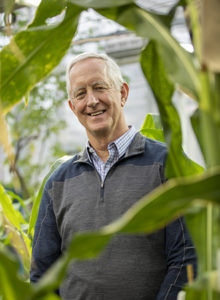Autophagy has remarkable influence on plant metabolism — even in healthy growing conditions

Reduce, reuse, recycle. Or just stick with recycle.
A plant relies on cellular machinery to recycle materials during times of stress, but that same machinery has a remarkable influence on the plant’s metabolism even under healthy growing conditions, according to new research from Washington University in St. Louis.
Autophagy is a process that helps to break down damaged or unwanted pieces of a cell so that the building blocks can be used again. In humans, autophagy is connected to a number of crippling diseases. In plants, it’s often associated with aging, or a response to nutrient starvation.
In a new publication in the journal Nature Plants, researchers led by Richard Vierstra, the George and Charmaine Mallinckrodt Professor of Biology in Arts & Sciences, describe the effects of autophagy on metabolism in maize (commonly referred to as corn) plants using a uniquely comprehensive set of modern “-omics” technologies.
“Maize is a very important crop, and is very sensitive to nitrogen deprivation,” Vierstra said. “One of the largest costs to growing maize in terms of energy, expenditures and a farmer’s time is providing adequate nitrogen to fertilize the soil. Consequently, we were particularly interested in how autophagy plays a role in nitrogen distribution and growth under nitrogen-limiting conditions.”
“This is the first report describing the effect of autophagy using four different ‘-omics’ approaches and successfully integrating them into a complete picture,” said Fionn McLoughlin, a postdoctoral researcher in Vierstra’s lab and first author of the new paper.
For the full article, visit The Source.



